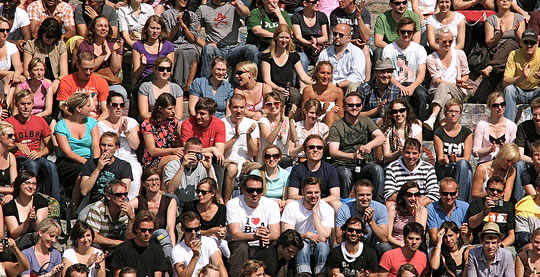Where is this crowd looking?
It’s an ability we all use without giving it a second thought.
We can see a crowd of people staring off in another direction and be able to turn around and look almost exactly where they are looking.
Dr. Timothy Sweeny, who studies visual perception, explains it like this:
“Imagine sitting in the stands at a baseball game.
Out of the blue, a dozen people shift their gaze upward, right above your head.
Your reaction to this information — is a foul ball headed your way? — will be different than if just one person looked over your head.”
While it feels perfectly natural to follow a group’s gaze, the almost instant calculation our brains are doing is very complex.
How does it work?
New research, published in the journal Psychological Science, explores how the brain is able to make the calculation so quickly (Sweeny & Whitney, 2014)
To investigate, the researchers had people looking at various computer-generated crowds in which varying numbers of people’s gaze was different.
After seeing the crowd for only one-fifth of a second, people were able to estimate where they were looking with remarkable accuracy.
They also found that the more gazes in the group were pointed in the same direction, the more accurate people were.
This was despite the fact that one-fifth of a second is not long enough to look around the faces individually.
Instead, they think, our brains process the whole crowd as a single entity.
Sweeny, who led the new research explained:
“We see the group as an entity, the same way we see an entire tree without paying attention to the individual leaves.
What our brains are doing is picking up the ‘visual gist’ of the scene using a special process vision scientists call ‘ensemble coding’.
All kinds of other studies have found we have remarkable abilities resulting from ensemble encoding. We can:
- average the emotions of 16 different faces in half a second.
- quickly determine the average size of shapes.
- even guestimate the male to female ratio in a crowd pretty accurately.
All of this likely because of…
“…the importance of group behavior in human experience — perceiving groups is so important that we have, in fact, evolved dedicated brain processes to perceive them.”
Image credit: Espen Sundve

